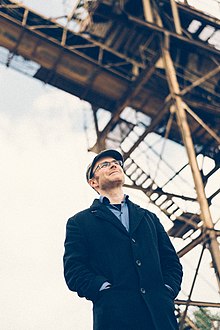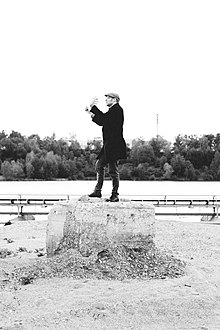Christoph Maria Wagner
Christoph Maria Wagner (born November 28, 1966 in Pfullendorf ) is a German composer , conductor and pianist.
Life
Christoph Maria Wagner received his musical training at the Cologne University of Music in the subjects of composition with Krzysztof Meyer and conducting with Volker Wangenheim and in piano with Klaus Oldemeyer . Since 1995 he has been teaching at the Cologne Music Academy.
As a conductor, Wagner is primarily committed to the music of the 20th and 21st centuries. In this function he worked with the composers Helmut Lachenmann , Mauricio Kagel , Nicolaus A. Huber and Klaus Huber , as well as with the Ensemble Modern and the Junge Deutsche Philharmonie . A solid, long-term collaboration connects him with the E-MEX ensemble. Guest conductors have taken him to the Cologne Opera, the Kölner Schauspielhaus, the WDR Radio Orchestra, the Oldenburg Ensemble "oh ton" and the Doelen Ensemble Rotterdam. Christoph Maria Wagner supervised the performance of Bernd Alois Zimmermann's opera “The Soldiers” at the Ruhrtriennale 2006 and 2007 and at the Lincoln Center Festival 2008 in New York as choir director, repetitor and assistant to Steven Sloane.
As a pianist, in addition to his own works, he regularly performs works of classical modernism (Ives, Jolivet, Stockhausen) and makes radio recordings for WDR and Deutschlandfunk.
plant
Christoph Maria Wagner began his compositional development at the age of 15, but it was only with his first "valid" piano works in 1987 that he developed a compositional principle based on arithmetic, from which harmonic and formal developments can be derived.
In spite of all the diversity of occupations and forms in Wagner's further work, a second focus is on musical drama. Musical and dramatic works range from a small cast ( fairytale hour , a one-person revue based on a Persian fairy tale) to the large-scale opera “The Night of The Living Dead” based on the feature film of the same name. It is typical that, by their nature, "undramatic" texts are converted into libretti, e.g. B. a sermon by Master Eckart (“The Sacrificial Stock”) or a Buddhist Koan text (“The Finger”). Also in his chamber music, e.g. B. in Viva il pubblico! (1999) for wind quintet, Wagner sets musical and dramatic accents that demand theatrical action from the performers.
Since 2009, Wagner has been pursuing another line with “remix” compositions: based on the practice of club music, the material of given works is literally “remixed” and thus converted into the current tonal language. These can also be particularly well-known models such as the first movement of Beethoven's 5th Symphony or German folk songs.
Awards
- 1992 Culture Prize of the City of Constance
- 1999: 1st prize in the international composition competition of the European Flute Festival
- 2013/2014 composer for Hagen
Web links
Remarks
- ^ Robert Nemecek: Text accompanying the CD "Christoph Maria Wagner: Piano Works" Cybele SACD 160.601
- ↑ Interview with Christoph Maria Wagner: Archive link ( Memento of the original from July 9, 2016 in the Internet Archive ) Info: The archive link was inserted automatically and has not yet been checked. Please check the original and archive link according to the instructions and then remove this notice.
- ↑ deutschlandfunk.de : Christoph Maria Wagner "But if the third day comes" , April 11, 2015
| personal data | |
|---|---|
| SURNAME | Wagner, Christoph Maria |
| BRIEF DESCRIPTION | German composer, conductor and pianist |
| DATE OF BIRTH | November 28, 1966 |
| PLACE OF BIRTH | Pfullendorf |

